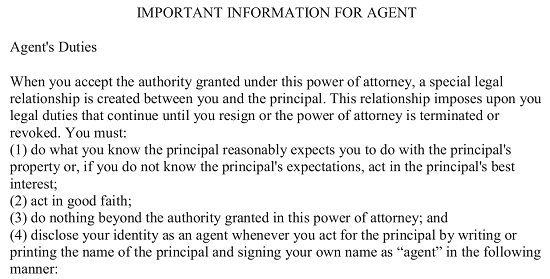Updated August 08, 2023
An Arkansas general power of attorney (GPOA) gives financial decision-making powers to an agent the principal chooses. The agent will be required to manage the principal’s affairs and in their best interest. Under a GPOA, the form becomes void if the principal should become incapacitated (Dementia, Alzheimer’s Disease, etc.).
if the principal would like to have the agent’s powers remain valid, if the principal becomes incapacitated, use a durable power of attorney form instead.
Laws
- Statutes – Uniform Power of Attorney Act (§§ 28-68-101 to 28-68-406)
- Authority (A.C.A. § 28-68-201) – An agent under a power of attorney may act on behalf of the principal and exercise broad authority as granted by the agreement.
- Signing Requirements (A.C.A. § 28-68-105) – Notary Public.
How to Write
Download: PDF
1 – Acquire Your Copy Of The General Power Of Attorney Template For Arkansas
Utilize the grey “PDF” button on this page to obtain your copy of this delegation. You may enter information directly on-screen with the appropriate browser or editing program. Generally, you should save this file for future use.
2 – Name The Arkansas Principal And The Attorney-in-Fact(s)
The sentence opening this declaration of principal power begins with a request for your full name. Enter it after the word “I…” If you are preparing this document for a review and signing for the Principal, then document his or her name on this line. The person declared here will be granting his or her authority to the Attorney-in-Fact to use when acting on his or her behalf.  Notice the wording of this sentence will lead to an area with three labeled lines; “Name Of Agent,” “Agent’s Address,” and “Agent’s Telephone Number.” These items refer to the Attorney-in-Fact who will have the right to represent the Principal named above because of the approval this paperwork grants. Make sure that the entire name of the Attorney-in-Fact’s name is reported on the first of these items (“Name Of Agent”) then his or her legal address and current phone number on the lines that follow.
Notice the wording of this sentence will lead to an area with three labeled lines; “Name Of Agent,” “Agent’s Address,” and “Agent’s Telephone Number.” These items refer to the Attorney-in-Fact who will have the right to represent the Principal named above because of the approval this paperwork grants. Make sure that the entire name of the Attorney-in-Fact’s name is reported on the first of these items (“Name Of Agent”) then his or her legal address and current phone number on the lines that follow.  The second section of this document, named “Designation Of Successor Agent(s) (Optional),” will allow you the chance to take a precaution with the responsibilities you define here. A Successor Agent is a person whom you appoint with the same type and level of principal power to represent you as you intend to with the Attorney-in-Fact above. The only difference in this appointment is that the Attorney-in-Fact is granted principal power when this document goes in effect while the Successor Agent’s powers only go into effect if (and when) the Attorney-in-Fact is formally revoked, refuses to act, or is unable/unavailable to fulfill his or her role. Use the labeled items here to report the full “Name Of Successor Agent” along with the “Successor Agent’s Address” and the “Successor Agent’s Telephone Number.”
The second section of this document, named “Designation Of Successor Agent(s) (Optional),” will allow you the chance to take a precaution with the responsibilities you define here. A Successor Agent is a person whom you appoint with the same type and level of principal power to represent you as you intend to with the Attorney-in-Fact above. The only difference in this appointment is that the Attorney-in-Fact is granted principal power when this document goes in effect while the Successor Agent’s powers only go into effect if (and when) the Attorney-in-Fact is formally revoked, refuses to act, or is unable/unavailable to fulfill his or her role. Use the labeled items here to report the full “Name Of Successor Agent” along with the “Successor Agent’s Address” and the “Successor Agent’s Telephone Number.” 
3 – Formally Approve Of The Attorney-in-Fact’s Use Of General Authority
The “Grant Of General Authority” section is the next requiring attention. If you are a Preparer filling out this document, you must relinquish it to the Principal. This section can only be completed by the Principal issuing his or her authority. The list in this section is composed of general topics where the Principal’s authority would be required to maintain or effect its status in the Principal’s finances. He or she reviews each item, making sure to discuss his or her intentions with the Attorney-in-Fact(s) who will act in his or her name, then initial the blank line corresponding to a topic that the Principal wishes the Attorney-in-Fact to wield the same authority as that of the Principal. For instance, if the Attorney-in-Fact will be expected to handle the Principal’s real estate issues then the first, second, fifth, and thirteenth items may need to be initialed (depending on the level of representation the Principal wishes to bestow and what needs to be accomplished) as in the example below. 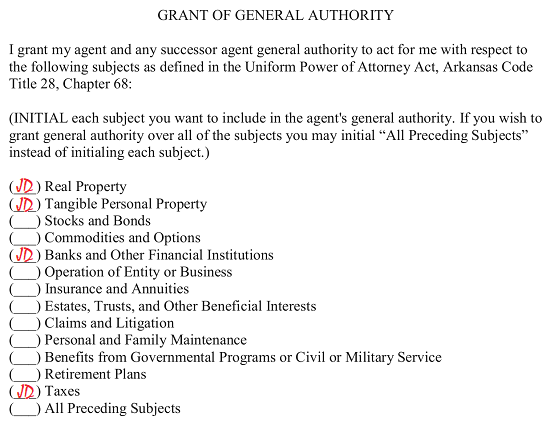 This list provides a useful option as a matter of convenience. If the Principal attending this list wishes to grant broad principal powers enabling the Attorney-in-Fact to act in all these matters on his or her behalf then only the last item, “All Preceding Subjects,” should be initialed. This will have the same effect as if the Principal had initialed each and every single item. It is strongly recommended that one seek consultation with a practicing attorney before issuing such a broad appointment.
This list provides a useful option as a matter of convenience. If the Principal attending this list wishes to grant broad principal powers enabling the Attorney-in-Fact to act in all these matters on his or her behalf then only the last item, “All Preceding Subjects,” should be initialed. This will have the same effect as if the Principal had initialed each and every single item. It is strongly recommended that one seek consultation with a practicing attorney before issuing such a broad appointment. 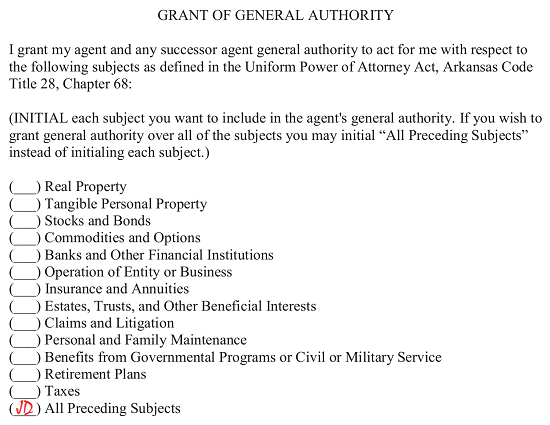
4 – Address Any Specific Powers The Attorney-in-Fact Is Expected To Employ
As mentioned earlier, the Attorney-in-Fact can be granted authority to engage in actions so sensitive they must be named separately and approved to be applied. First, locate the title “Grant Of Specific Authority (Optional)” then, review the list below it. Only the action statements that are initialed by the Principal in this section will be actions the Attorney-in-Fact can engage in on behalf of the Principal.  Thus, if the Principal wishes to grant the authority the Attorney-in-Fact the power to “Amend, Revoke, Or Terminate An Inter Vivos Trust” in his or her name then the first statement must be initialed.
Thus, if the Principal wishes to grant the authority the Attorney-in-Fact the power to “Amend, Revoke, Or Terminate An Inter Vivos Trust” in his or her name then the first statement must be initialed. 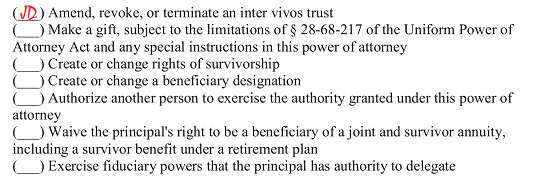 The second statement requires the Principal’s initials if the Attorney-in-Fact is expected to make gifts (in accordance with §28-68-217 of the Uniform Power of Attorney Act).
The second statement requires the Principal’s initials if the Attorney-in-Fact is expected to make gifts (in accordance with §28-68-217 of the Uniform Power of Attorney Act). 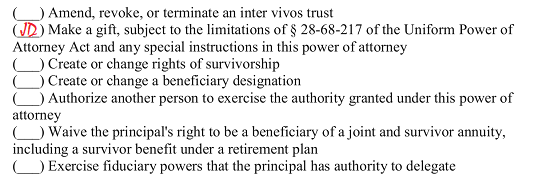 If the Principal wishes to grant the Attorney-in-Fact the right to “Create Or Change Rights Of Survivorship” using his or her name to do so, then the third statement must display the Principal’s initials.
If the Principal wishes to grant the Attorney-in-Fact the right to “Create Or Change Rights Of Survivorship” using his or her name to do so, then the third statement must display the Principal’s initials. 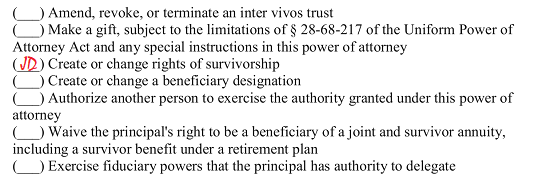 Similarly, the fourth statement must bear the Principal’s initials in order to grant the power to “Create Or Change A Beneficiary Designation”
Similarly, the fourth statement must bear the Principal’s initials in order to grant the power to “Create Or Change A Beneficiary Designation” 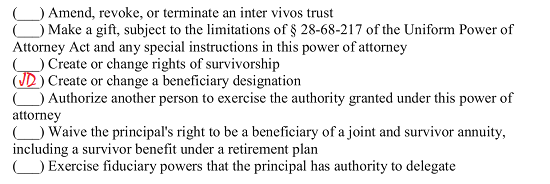 If the Principal authorizes the Attorney-in-Fact to “Authorize Another Person To Exercise The Authority Granted Under This Power…” then the fifth statement must have the Principal’s initials attached to it.
If the Principal authorizes the Attorney-in-Fact to “Authorize Another Person To Exercise The Authority Granted Under This Power…” then the fifth statement must have the Principal’s initials attached to it. 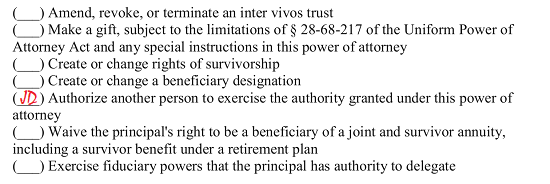 The sixth item in this list will give the Attorney-in-Fact the right to “Waive The Principal’s Right To Be A Beneficiary OF A Joint And Survivor Annuity…” if it is initialed by the Principal.
The sixth item in this list will give the Attorney-in-Fact the right to “Waive The Principal’s Right To Be A Beneficiary OF A Joint And Survivor Annuity…” if it is initialed by the Principal. 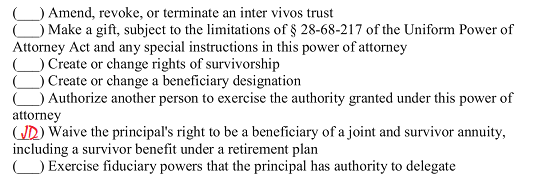 The last statement here should only be initialed by the Principal if he or she wishes to give the Attorney-in-Fact the ability to exercise the same fiduciary powers at the Principal’s disposal as if he or she were the Principal.
The last statement here should only be initialed by the Principal if he or she wishes to give the Attorney-in-Fact the ability to exercise the same fiduciary powers at the Principal’s disposal as if he or she were the Principal. 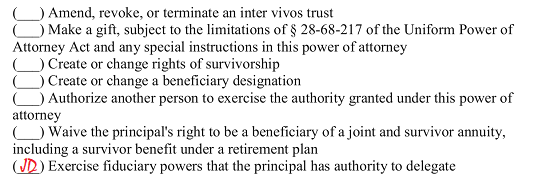 One final optional section has been included in this paperwork. Titled “Special Instructions (Optional).” Here the Principal may deliver instructions to the Attorney-in-Fact directly. The blank lines presented here will receive any limitations, restrictions, instructions, preferences, or extensions of power that the Principal wishes to be a part of this appointment.
One final optional section has been included in this paperwork. Titled “Special Instructions (Optional).” Here the Principal may deliver instructions to the Attorney-in-Fact directly. The blank lines presented here will receive any limitations, restrictions, instructions, preferences, or extensions of power that the Principal wishes to be a part of this appointment. 
5 – Some Additional Details On The Powers The Attorney-in-Fact Will Wield
Naturally, we will want to define precisely when the Attorney-in-Fact will be using the Principal’s name and when he or she will no longer be able to wield principal authority. To this end locate the “Effective Date” section. The first task set for you, the Principal, will be to initial one of two statements; each defining a method by which this document will deliver power to the Attorney-in-Fact. Initial the first statement if this document is “Effective Immediately”  If this document should empower the Attorney-in-Fact only if or when the Principal is incapacitated or disabled for a significant period then, initial the second statement.
If this document should empower the Attorney-in-Fact only if or when the Principal is incapacitated or disabled for a significant period then, initial the second statement.  You must read the wording in the first and second parts of this article. The second part of this article will conclude with two checkbox statements. If the powers designated to the Attorney-in-Fact will begin and terminate on specific calendar dates, then initial the statement “This Power Of Attorney Is Only Effective….” This selection requires you document the first calendar date when the Attorney-in-Fact can access principal power before the word “To” and the last calendar date when the Attorney-in-Fact’s principal power is effective after the word “To.”
You must read the wording in the first and second parts of this article. The second part of this article will conclude with two checkbox statements. If the powers designated to the Attorney-in-Fact will begin and terminate on specific calendar dates, then initial the statement “This Power Of Attorney Is Only Effective….” This selection requires you document the first calendar date when the Attorney-in-Fact can access principal power before the word “To” and the last calendar date when the Attorney-in-Fact’s principal power is effective after the word “To.”  If you wish to define when and how this document becomes effective and when it terminates because none of the choices above fit your needs, then initial the blank line labeled “Other. Please Specify.” If you this is the case, you are required to give a well thought out definition to when and how principal authority is available for the Attorney-in-Fact’s use
If you wish to define when and how this document becomes effective and when it terminates because none of the choices above fit your needs, then initial the blank line labeled “Other. Please Specify.” If you this is the case, you are required to give a well thought out definition to when and how principal authority is available for the Attorney-in-Fact’s use  Now that you have defined the principal powers and the parties directly involved, you may continue with an additional precaution. The “Nomination Of Guardian (Optional)” section will consider a scenario where the courts are required to appoint a guardian for your estate and/or your physical care. This process is internal to the court system and while you cannot officially name a Guardian yourself, you can make suggestions or nominations that a ruling body can take into consideration. To do so, simply fill in the full “Name Of Nominee For Guardian Of My Estate” line with your nomination then, report his or her address and phone number(s) to the blank lines below this.
Now that you have defined the principal powers and the parties directly involved, you may continue with an additional precaution. The “Nomination Of Guardian (Optional)” section will consider a scenario where the courts are required to appoint a guardian for your estate and/or your physical care. This process is internal to the court system and while you cannot officially name a Guardian yourself, you can make suggestions or nominations that a ruling body can take into consideration. To do so, simply fill in the full “Name Of Nominee For Guardian Of My Estate” line with your nomination then, report his or her address and phone number(s) to the blank lines below this. 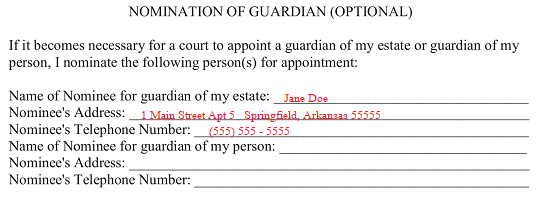 If you wish to nominate an individual to safeguard your person as a Guardian, then you may do so by documenting your choice’s full name on the “Name Of Nominee For Guardian Of My Person” line then furnishing his or her address and telephone number to the next two blank lines.
If you wish to nominate an individual to safeguard your person as a Guardian, then you may do so by documenting your choice’s full name on the “Name Of Nominee For Guardian Of My Person” line then furnishing his or her address and telephone number to the next two blank lines. 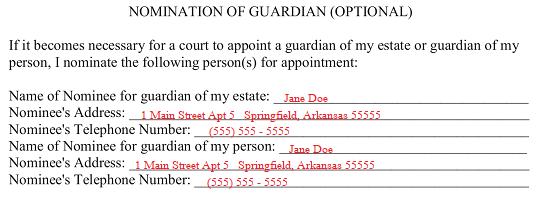 Read the completed document. Thoroughly. If this represents your intentions, then sign your name on the “Signature” line in the “Reliance On This Power Of Attorney” section.
Read the completed document. Thoroughly. If this represents your intentions, then sign your name on the “Signature” line in the “Reliance On This Power Of Attorney” section. 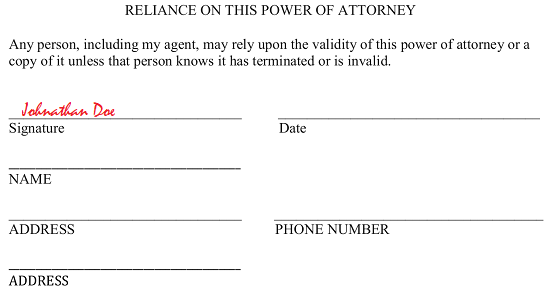 You must print your name on the line labeled “Name.”
You must print your name on the line labeled “Name.” 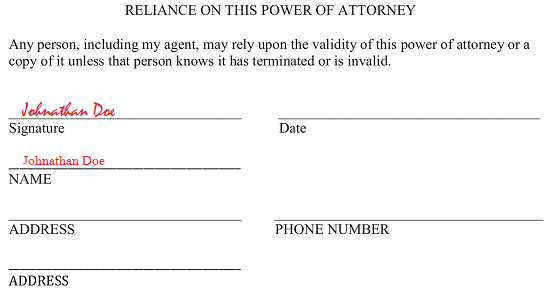 Immediately after you have signed and printed your name, direct your attention to the right then enter the signature date
Immediately after you have signed and printed your name, direct your attention to the right then enter the signature date 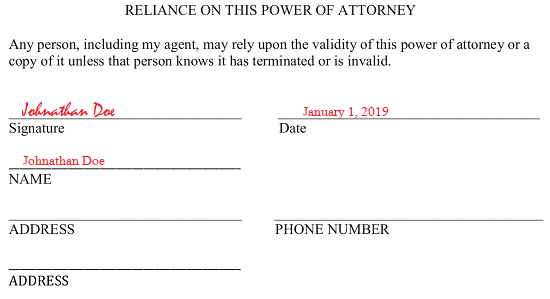 Finally, use the two “Address” lines and “Phone Number” line to report your contact information.
Finally, use the two “Address” lines and “Phone Number” line to report your contact information.
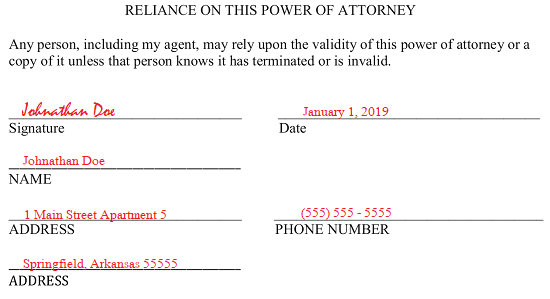 The next page is for the use of the Arkansas Notary Public in attendance. He or she will use this page to prove the authenticity of this document by subjecting it to the notarization process.
The next page is for the use of the Arkansas Notary Public in attendance. He or she will use this page to prove the authenticity of this document by subjecting it to the notarization process. 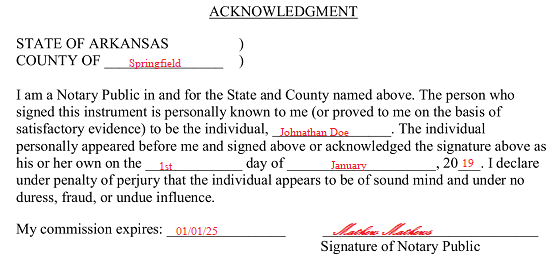 The remainder of this paperwork will present some valuable information to the Attorney-in-Fact. He or she should make sure to read this document to the end.
The remainder of this paperwork will present some valuable information to the Attorney-in-Fact. He or she should make sure to read this document to the end. 